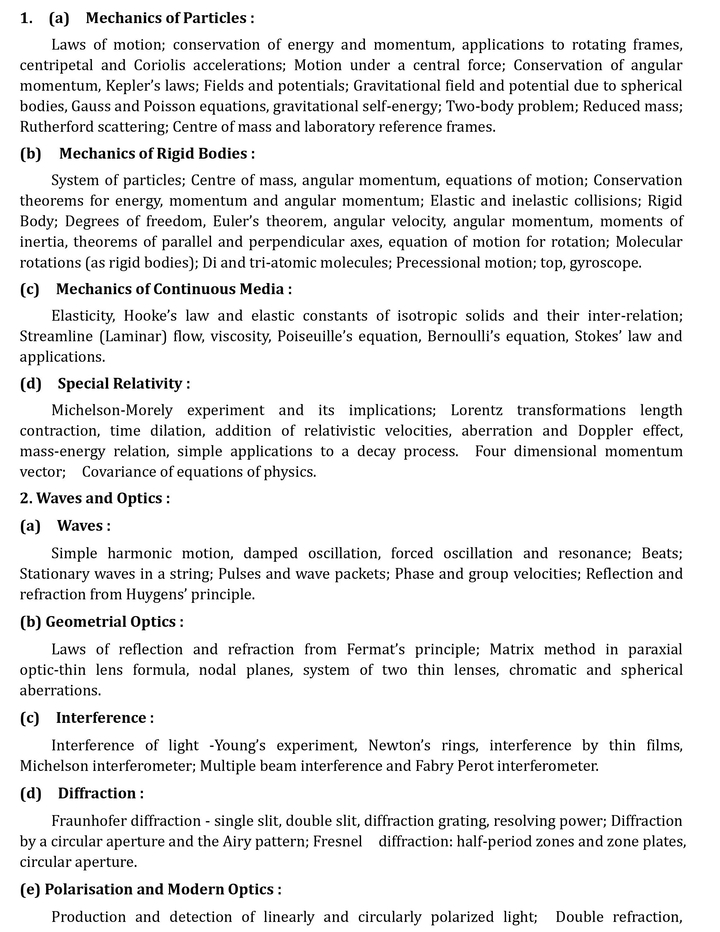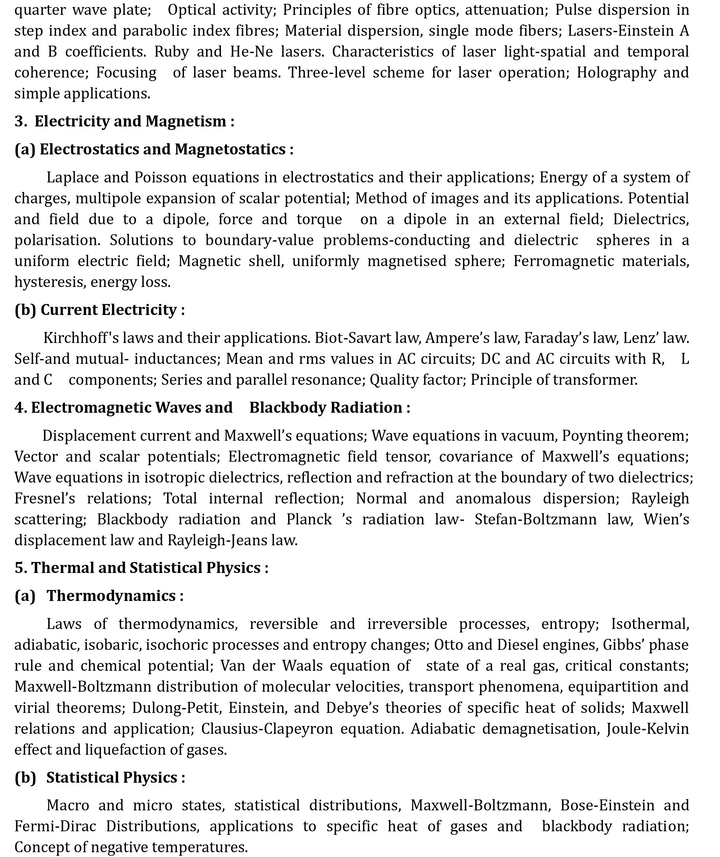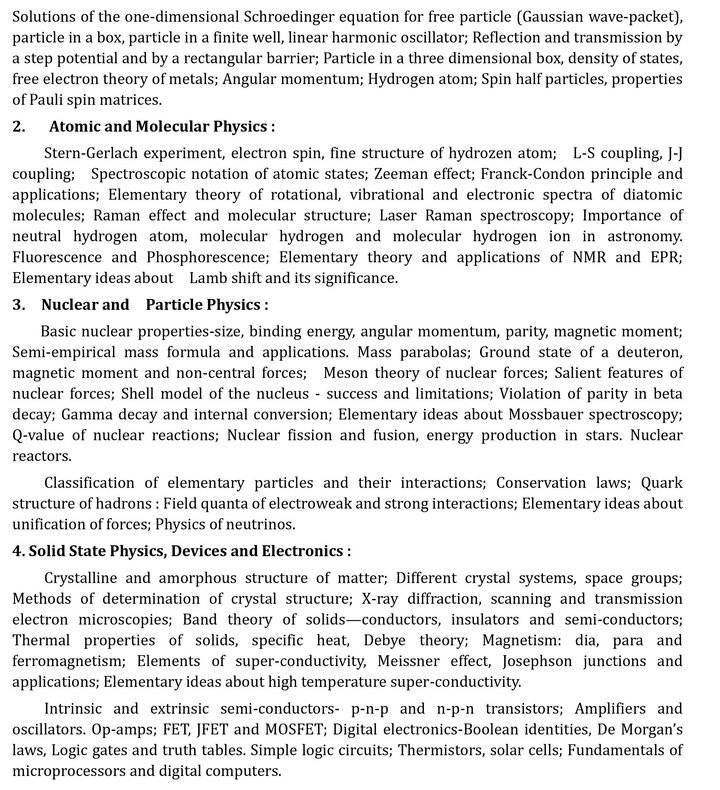UPSC Physics Optional Syllabus – Latest UPSC Physics Syllabus PDF
By BYJU'S Exam Prep
Updated on: November 14th, 2023
UPSC Physics Optional Syllabus would feel relevant to candidates who have studied physics at their Graduate or Postgraduate level. Like all the other science optional subjects, UPSC Physics Syllabus includes the topics of bachelor’s degree level and is divided into paper 1 and paper 2, each carrying a total of 250 marks. UPSC Physics Optional Syllabus includes topics like Thermodynamics, Magnetism, Relativity, Electricity quantum theory, Electromagnetic Waves, Diffraction, etc.
As Physics is a specialized subject, candidates must take a strategic approach while covering the Physics Optional UPSC syllabus. More application-based questions are asked in this subject paper rather than theory questions. Candidates can also download the UPSC Physics Syllabus PDF using the link mentioned below.
Table of content
UPSC Physics Optional Syllabus
Covering the UPSC physics optional syllabus requires a high level of proficiency; that’s why candidates who have opted for physics should start their preparation early. While preparing for this subject, candidates should have the UPSC Physics Syllabus on their table so that they won’t miss out on crucial topics.
Let’s check out the complete paper-wise Physics Optional Syllabus below.
| UPSC Physics Optional Syllabus | Topics |
| Paper 1 | – Mechanics of Particles
– Waves and Optics – Electricity and Magnetism – Electromagnetic Waves and Blackbody Radiation – Thermal and Statistical Physics |
| Paper 2 | – Quantum Mechanics
– Atomic and Molecular Physics – Nuclear and Particle Physics – Solid State Physics, Devices, and Electronics |
If you are confused about opting for Physics as your optional subject, we have added the pros and cons of the UPSC Physics Syllabus below to make things easier for you. It would help you with making a final decision.
Pros of UPSC Physics Syllabus:
- If you write the answer correctly, then you can fetch good marks, as nothing is subjective.
- If you have a solid base, then there won’t be any difficulty in covering the UPSC Physics optional syllabus.
- The syllabus is static, and the pattern is set.
Cons of Physics Optional UPSC:
- The overlap of the UPSC Physics syllabus with GS papers is minimal.
- Candidates with no background in physics would face difficulties in covering the physics optional UPSC syllabus.
- Ample revision of the topics is required to perform well.
UPSC Physics Syllabus PDF
Physics is a fundamental Science subject that is taught from the elementary grades till graduation or higher levels. UPSC Physical Optional Syllabus covers topics from the graduation level, which makes it highly technical and field-specific. Aspirants preparing for the Mains 2023 Civil Services exam can download the Physics optional syllabus in Hindi and English from the official website of the Union Public Service Commission or from the direct links below.
Let us now go through the topics covered in Paper 1 and Paper 2 of the UPSC Physics optional syllabus.
Physics Optional Syllabus Paper 1
The UPSC Physics Optional Syllabus for Paper 1 is divided into 5 topics which are Classical Mechanics, Waves and Optics, Electricity and Magnetism, Electromagnetic Waves and Blackbody Radiation, and Thermal and Statistical Physics. Below we are going to discuss the sub-topics covered under these topics.


UPSC Physics Optional Syllabus for Paper 2
Quantum Mechanics, Atomic and Molecular Physics, Nuclear and Particle Physics, Solid State Physics, Devices, and Electronics are part of Paper 2 of the UPSC Physics Optional Syllabus. Candidates can take a complete look at the UPSC Physics syllabus for Paper 2 tabulated below.


How to Prepare UPSC Physics Optional Syllabus?
The UPSC physics syllabus is vast, but the candidates who have effectively prepared won’t face any problems. Let’s uncover the preparation strategy that will help you to fetch good marks in the Physics optional.
- Make notes of all topics mentioned in the UPSC Physics Optional Syllabus. Be thorough with the concept, and build a solid problem-solving skill that is required to score good marks.
- Practice as much as possible and multiple methods to solve the questions should be known for Paper 1. Paper 2 has more theoretical questions, so you must develop knowledge of both classical and modern physics.
- You can practice the UPSC previous year question papers along with covering the Physics Optional Syllabus.
- Make a 20-30 page summary of the entire UPSC physics syllabus for revision on the way before the final day.
☛ Also Check:
- How to Prepare History for UPSC?
- How to Prepare Geography for UPSC?
- How to Prepare Current Affairs for UPSC?
Best Books for Physics Syllabus for UPSC
If you want smooth completion of the UPSC Physics Optional Syllabus, then choose the highly referred books by the IAS toppers. We have prepared a booklist to help you easily comprehend the syllabus of Papers 1 and 2.
Books for Paper 1 of UPSC Physics Optional Syllabus
- Mechanics By D S Mathur
- Optics By Brijlal and Subrahmaniyam
- Electrodynamics & EM Theory: David Griffiths
- Thermal & Statistical Physics by Garg, Bansal, and Ghosh
Books for Paper 2 of UPSC Physics Syllabus
- Quantum Physics: Resnick & Eisberg
- Concepts of Modern Physics: Arthur Beiser
- Solid State Physics: S.O. Pillai
- Electronics: B L Thareja Vol. IV
